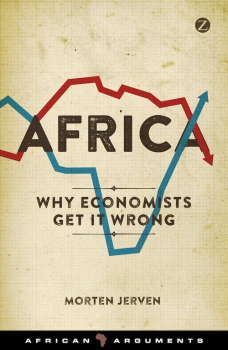Book: 'Africa - Why economists get it wrong'

AFRICA: WHY ECONOMISTS GET IT WRONG, by Morten Jerven. Published by Zed Books
Jerven's previous book on the futility of trusting any so-called data emerging from Africa was excellent and at times funny, as in "if you don't laugh you'll cry" funny. Now he has turned his attention to why no one can decide whether Africa is booming or fated to fail.
In 1997 the ever-pompous Economist informed us, "sub-Saharan Africa is in better shape than it has been in a generation." Three years later they declared it a hopeless continent. "Does Africa have some inherent character flaw that keeps it backward and incapable of development?" The Economist asked. Yet in 2011 their tune had changed once more, and they declared Africa was on the rise. This prompted a South Africa business magazine to ask, "Do the editors of The Economist have a character flaw that makes them incapable of consistent judgement?"
Jerven explodes some long-standing myths circulated by people who make their living analysing why development aid to Africa fails. First, he asks, what is the point of comparing Tanzania with Japan, for instance, as if that will provide clues to Africa's economic problems? Nothing is learned in contrasting two such different places, yet it is a favourite approach used by 'experts'.
He proves that the decades immediately after independence, when African governments followed more socialist plans using state intervention, were not the failure we are now told. In fact it was actually the liberalization policies forced on developing countries by the World Bank and IMF which led to much greater economic suffering and lack of growth.
Regarding the current journalistic froth about the continent's phenomenon growth, Jerven demonstrates the boom is entirely based on the export of minerals and oil to feed the Chinese economic powerhouse: it benefits few beyond the elite. On the way, he carefully tears apart the faulty ways in which we use unreliable data to measure African economies.
He argues there has been too much emphasis among academics on why Africa fails rather than useful policy recommendations of how states - real states, not the ideal fantasy economies that don't actually exist - succeed. He finds is more useful to see African states as fragile, lacking worthy institutions, and therefore vulnerable to global economic downturns.
My only quibble is he assumes growing populations will provide a larger pool of labour to fill posts in administration and the professions. Yet, this will not happen without a vastly improved education system. He also fails to mention the underemployment of so many men who regard any labour using their hands as beneath them, while their women work themselves into an early, if unproductive grave.
This is not an easy read, because Jerven is a serious economist, but for those care about the future of Africa, (and whether international aid is useful), it is illuminating.















